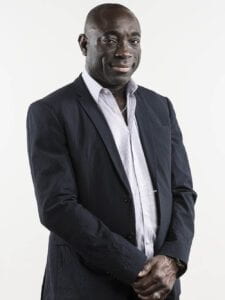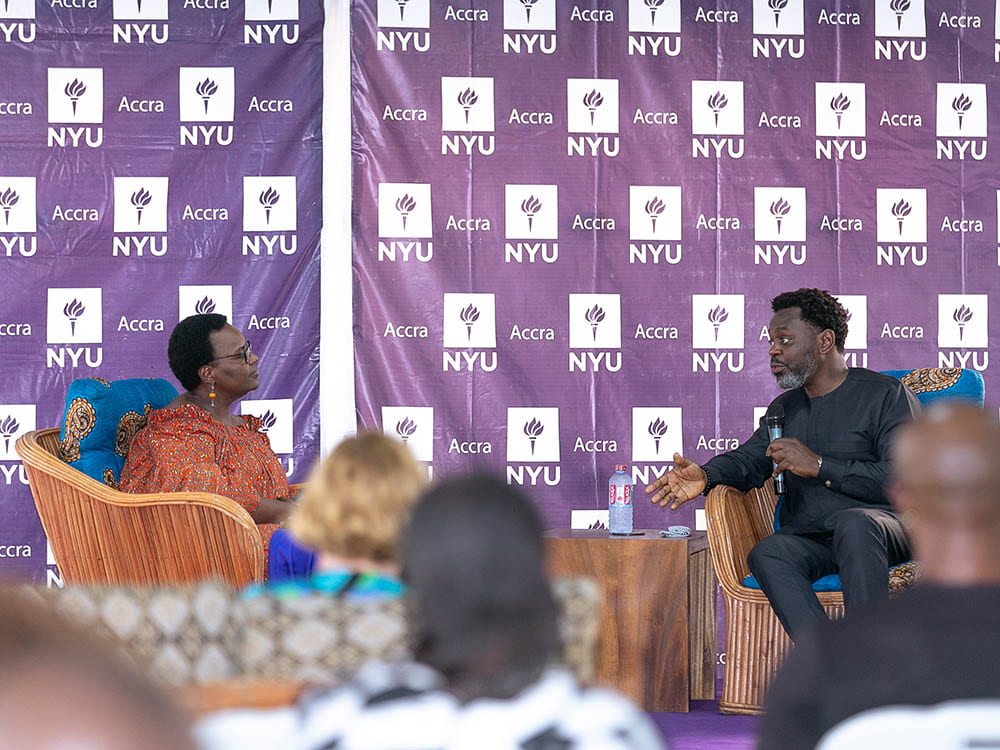
Prior to his time as the site director of NYU Accra, Chiké Frankie Edozien spent 11 years leading the site’s Reporting Africa program. An award-winning journalist and author, Edozien’s work focuses on government, health, and cultural issues in Africa and across the globe. His memoir, Lives of Great Men: Living and Loving as an African Gay Man, an exploration of the lives of contemporary LGBTQ+ men and women on the African continent and in the diaspora, won the 2018 Lambda Literary Award for Gay Memoir/Biography. His work has appeared in Time and the New York Times, among others, and from 1999 to 2008, he worked as a reporter for the New York Post. In 2017 Edozien was awarded NYU’s Dr. Martin Luther King, Jr. Faculty Award for excellence in teaching, community building, social justice advocacy, and leadership.
When Edozien started his tenure as the NYU Accra director in January 2020, the phrase “in and of the city” inspired his approach to leadership. And even through the challenges of the COVID-19 pandemic, he has continued to build a bridge between the University and local Ghanaian community, creating an atmosphere of immersive learning for students eager to truly become citizens of the world.
Global Dimensions recently interviewed Edozien about his time leading NYU Accra, his initiative to work closer with the local community, and his hopes for the students he works with.
Interviewer and writer: Kelly McHugh-Stewart
Q: You started as director in 2020, I imagine that was an interesting time to begin a new role, and I’m sure there have been obstacles, but could you start by sharing a few highlights from your time as director thus far?
Chiké Frankie Edozien: Of course. There have been several. I think Go Local is one of the things I enjoyed. That was two semesters of working with students who lived in Ghana but were unable to travel to their NYU home campuses due to the pandemic. During that year in particular, we were able to not just deliver education to students but also show them a Ghana they never knew. It was very gratifying to teach people who were born and bred in Ghana and have them tell us, “We didn’t know about any of this!”
It’s also been really wonderful to revamp some of the courses we offer and try to make sure we are giving students the best academic experience. We’ve updated our food, music, and journalism courses. We also took advantage of the fact that the fall season has a lot of cultural festivals and created arts and humanities courses. We’re not divorced from anything that’s happening in Accra; that’s certainly a highlight for me.
Q: Related to that, tell me about the Labone Dialogues series you established.
CFE: Yes, that has been another highlight. One of the things that is very interesting for me is that, even though we might be the smallest global site, we have a lot going on and we offer a lot to our neighbors. I thought about all the wonderful things we have access to, all the wonderful people who come into contact with our students and into our classrooms, and I wanted to find a way to bring the things we do to the public and provide access for people in the community.
In the last three years, we’ve hosted 10 conversations, and we’ve had wonderful scholars, musicians, and artists here. We’re not just about educating our people, we’re about sharing our resources and encouraging local production of knowledge.
Q: That’s amazing. Can you share a little more about what goes into the Labone Dialogues?
CFE: It starts with some kind of student engagement, which is not open to the public, then there’s a master class for the community to come in, listen, and ask questions. But we also have a craft session for select community members who do not normally have a chance to meet these people NYU has access to. They get to come and work on their craft whether it’s a book, theatre project, or music piece. For us, we think of it as a gift to the community for hosting us in their city, and it has been quite gratifying to be able to share the resources we have with them.

Nigerian writer, Leye Adenle (right), in conversation with Kinna Likimani (left) at a Labone Dialogues community event in February of 2023.
Q: What is unique about NYU Accra and why would you encourage students to spend time studying there?
CFE: NYU Accra is at the center of the world, not just physically but also in terms of the changing world. Ghana is not a developed nation; it is a developing nation. And with that comes a lot of challenges but also a lot of opportunities to do very meaningful work. When we place interns in companies, they are not fetching coffee or making photocopies—they are working on projects. Whether it’s trying to find and deliver vaccines to people, auditing corporations, or sourcing portable water resources, our students have access. I teach journalism and know that, even as a professional journalist, it’s difficult to get an audience with the mayor of a town or the statehouse in the United States, but our journalism students have access to government officials and private businesses. They get answers to their questions.
Our students can also meet ordinary people because we don’t have an NYU bubble here. We really are in and of the city. To have an African experience in your undergraduate years is a wonderful thing, but to be able to do it in a place where you have access to everyone, where almost nothing is beyond your grasp—that’s really quite an experience.
Q: What do you hope students take away from their time in Accra?
CFE: I would like them to really take a bite out of the world. We work very hard to ensure that when a student comes to study in Accra, they’re not just coming to study, they’re really coming to spend a semester in the region. We understand ourselves as NYU Accra, but we also understand ourselves as NYU in Ghana, so we spend a good chunk of the semester showing students all the different experiences and different regions. It’s important to us that our students talk about their time here with a sense of authority—not that they just studied in Accra, but they lived in Ghana, they lived in West Africa, and they understand the nuances. And that’s what we want for them: that they can truly be global citizens.
Q: You recently had a short story, “Krifé,” published in the new book Relations: An Anthology of African and Diaspora Voices. Congrats!
CFE: I think that came out in January, so it’s very new!
Q: What does “krifé” mean and what is the story about?
CFE: “Krifé” is a colloquial way of referring to a certain kind of folk in Ghana who are very much into their religion. So that work is really an observation about class differences in West Africa, an observation of people who make assumptions about others, while understanding that not everything is as it seems. One advantage of being here is, in everything that I do, I can really observe how contemporary West African society is versus what’s been written about it. It is my hope that by the time I’m finished here, I can do more pieces like that.
Q: What book are you currently reading?
CFE: I just got this book called For What Are Butterflies Without Their Wings. It’s by the Kenyan writer Troy Onyango and is a collection that has a razor-like focus on different kinds of East Africans—people who are trans, people whose families might be considered different, people who are going through different things—in contemporary society. I’m very much interested in his take on things. I just started it, but I’m hoping it gives me a better understanding of the region on the other side of us.
Q: Finally, what is one book you’d recommend to a student interested in studying in Accra or someone who simply wants to learn more about the area?
CFE: I recommend a book by Ghanaian writer Esther Armah; it’s called Emotional Justice: A Roadmap for Racial Healing. I like her take because she lives in Ghana, but she also lived and worked in the United Kingdom and the United States. There has been a lot of turmoil over the last few years, and one of the things that’s very important for us as scholars and people is to not only look at what’s happened but how we can get past it. How do we move forward? She takes a good look at that, not just from an African perspective, but from the perspective of an African who has been an observer and bystander in the Western world.
And with our young people, it’s really up to us as professors and site directors to make these kinds of books and conversations available so that, in their own time, they can think about them and make the world a better place. For us, that’s very important. At this site in West Africa, we are part of the conversation in a way that works toward healing. So I recommend this book to anyone interested in this region because what happens in the United States is not disconnected from what happens here. We may be far away, but we are connected in more ways than it seems.






